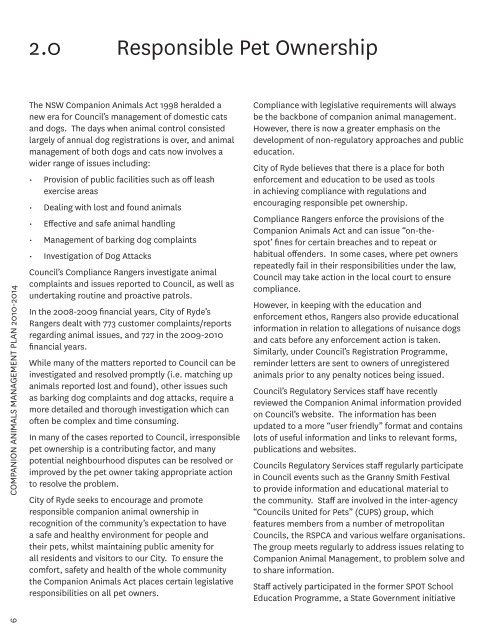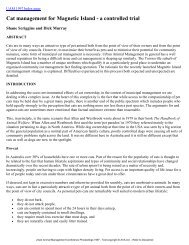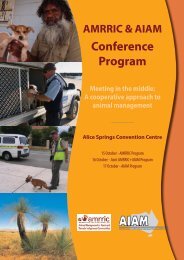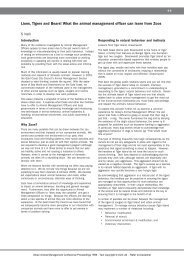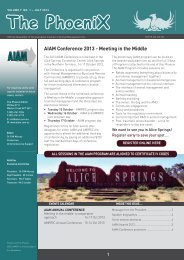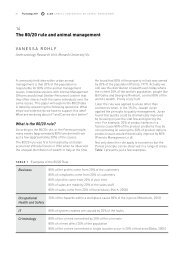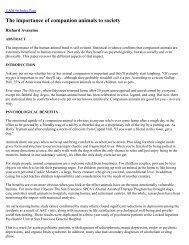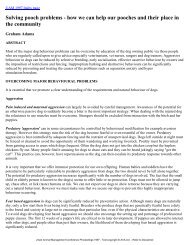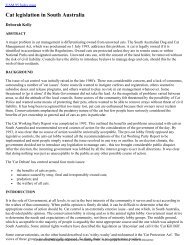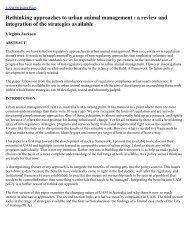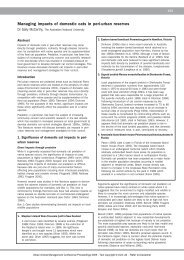Companion Animals Management Plan 2010-2014 - City of Ryde
Companion Animals Management Plan 2010-2014 - City of Ryde
Companion Animals Management Plan 2010-2014 - City of Ryde
Create successful ePaper yourself
Turn your PDF publications into a flip-book with our unique Google optimized e-Paper software.
2.0 Responsible Pet Ownership<br />
6 COMPANION ANIMALS MANAGEMENT PLAN <strong>2010</strong>-<strong>2014</strong><br />
The NSW <strong>Companion</strong> <strong>Animals</strong> Act 1998 heralded a<br />
new era for Council’s management <strong>of</strong> domestic cats<br />
and dogs. The days when animal control consisted<br />
largely <strong>of</strong> annual dog registrations is over, and animal<br />
management <strong>of</strong> both dogs and cats now involves a<br />
wider range <strong>of</strong> issues including:<br />
• Provision <strong>of</strong> public facilities such as <strong>of</strong>f leash<br />
exercise areas<br />
• Dealing with lost and found animals<br />
• Effective and safe animal handling<br />
• <strong>Management</strong> <strong>of</strong> barking dog complaints<br />
• Investigation <strong>of</strong> Dog Attacks<br />
Council’s Compliance Rangers investigate animal<br />
complaints and issues reported to Council, as well as<br />
undertaking routine and proactive patrols.<br />
In the 2008-2009 financial years, <strong>City</strong> <strong>of</strong> <strong>Ryde</strong>’s<br />
Rangers dealt with 773 customer complaints/reports<br />
regarding animal issues, and 727 in the 2009-<strong>2010</strong><br />
financial years.<br />
While many <strong>of</strong> the matters reported to Council can be<br />
investigated and resolved promptly (i.e. matching up<br />
animals reported lost and found), other issues such<br />
as barking dog complaints and dog attacks, require a<br />
more detailed and thorough investigation which can<br />
<strong>of</strong>ten be complex and time consuming.<br />
In many <strong>of</strong> the cases reported to Council, irresponsible<br />
pet ownership is a contributing factor, and many<br />
potential neighbourhood disputes can be resolved or<br />
improved by the pet owner taking appropriate action<br />
to resolve the problem.<br />
<strong>City</strong> <strong>of</strong> <strong>Ryde</strong> seeks to encourage and promote<br />
responsible companion animal ownership in<br />
recognition <strong>of</strong> the community’s expectation to have<br />
a safe and healthy environment for people and<br />
their pets, whilst maintaining public amenity for<br />
all residents and visitors to our <strong>City</strong>. To ensure the<br />
comfort, safety and health <strong>of</strong> the whole community<br />
the <strong>Companion</strong> <strong>Animals</strong> Act places certain legislative<br />
responsibilities on all pet owners.<br />
Compliance with legislative requirements will always<br />
be the backbone <strong>of</strong> companion animal management.<br />
However, there is now a greater emphasis on the<br />
development <strong>of</strong> non-regulatory approaches and public<br />
education.<br />
<strong>City</strong> <strong>of</strong> <strong>Ryde</strong> believes that there is a place for both<br />
enforcement and education to be used as tools<br />
in achieving compliance with regulations and<br />
encouraging responsible pet ownership.<br />
Compliance Rangers enforce the provisions <strong>of</strong> the<br />
<strong>Companion</strong> <strong>Animals</strong> Act and can issue “on-thespot’<br />
fines for certain breaches and to repeat or<br />
habitual <strong>of</strong>fenders. In some cases, where pet owners<br />
repeatedly fail in their responsibilities under the law,<br />
Council may take action in the local court to ensure<br />
compliance.<br />
However, in keeping with the education and<br />
enforcement ethos, Rangers also provide educational<br />
information in relation to allegations <strong>of</strong> nuisance dogs<br />
and cats before any enforcement action is taken.<br />
Similarly, under Council’s Registration Programme,<br />
reminder letters are sent to owners <strong>of</strong> unregistered<br />
animals prior to any penalty notices being issued.<br />
Council’s Regulatory Services staff have recently<br />
reviewed the <strong>Companion</strong> Animal information provided<br />
on Council’s website. The information has been<br />
updated to a more “user friendly” format and contains<br />
lots <strong>of</strong> useful information and links to relevant forms,<br />
publications and websites.<br />
Councils Regulatory Services staff regularly participate<br />
in Council events such as the Granny Smith Festival<br />
to provide information and educational material to<br />
the community. Staff are involved in the inter-agency<br />
“Councils United for Pets” (CUPS) group, which<br />
features members from a number <strong>of</strong> metropolitan<br />
Councils, the RSPCA and various welfare organisations.<br />
The group meets regularly to address issues relating to<br />
<strong>Companion</strong> Animal <strong>Management</strong>, to problem solve and<br />
to share information.<br />
Staff actively participated in the former SPOT School<br />
Education Programme, a State Government initiative


